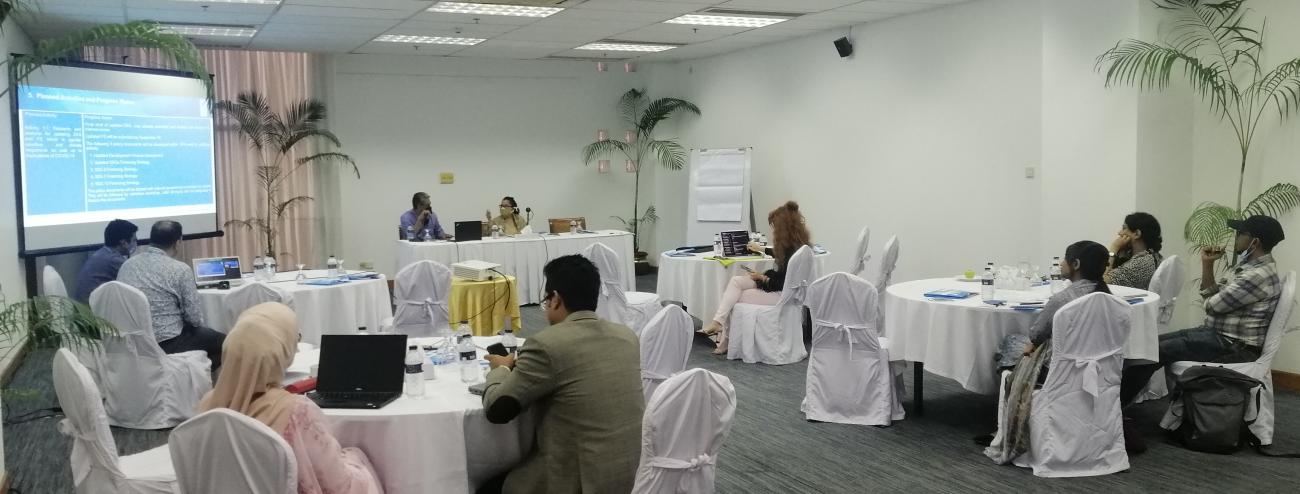Looking Ahead – INFF4SDGs Completes its first Year

INFF4SDGs successfully completed its first year of pilot phase in June 2021
INFF4SDGs successfully completed its first year of pilot phase in June 2021, meeting its required programmatic and financial delivery targets, through the contributions of each Partner UN Organizations (PUNOs), UNCDF, UNWOMEN, ILO & UNDP and under the political coordination of UNRCO. Moving forward towards the second and final year of this pilot phase, it was crucial to reflect and take stock of all the past achievements, gaps and limitations of the project to consolidate the future goals and expectations. The main objective was to strengthen the future approaches, anchoring the existing ongoing activities and coming up with a better coordination mechanism within and across the public and private sector actors. This would assist in implementing the new/updated SDG financing strategy and DFA for the next five years alongside integrating the SDG Financing Road Maps for SDG 6, SDG 7 and SDG 13 at the macro level development policy system of the Government of Bangladesh with high-level engagement. Ongoing strategic tasks such as Development Finance Assessment (DFA) and Financing Strategy (FS) for SDGs formulation, private sector impact management study, investment mapping study, business needs assessment of SMEs and MSMEs, private sector engagement in Bankable Projects and some other activities will enhance scopes of facilitating the resource mobilization for SDGs. In addition, some other crucial tasks such as establishing the governance mechanism, establishing and activating the multi-stakeholder platform with strong representation of the private sector are the key focus areas for the last year of this pilot phase. This internal workshop was organized for the innermost circle of the INFF4SDGs team, with the respective representatives from the PUNOs and the Joint Secretary, Ms. Baby Rani Karmakar from the Economic Relations Division (ERD), as the government representative.
The sessions were moderated by UNRCO’s Development Coordination Officer, Mr. Mazedul Islam. Each PUNO presented a progress of their work with updates on key issues like the 5 policy documents (updating the DFA and FS and 3 roadmaps for SDG6, SDG7 & SDG13 roadmaps), which will be shared with relevant government ministries for a review and validation. Gender responsive review of the DFA was part of this task. The ongoing agenda to establish Digital Trade Platforms, offering bankable projects in the 3 SDG priority areas (WATSAN, Renewable Energy, and Climate Finance) to investors, ready to be funded from blended finance opportunities (grants, debt, equity etc.)was also highlighted. Inclusive Digital Economy Scorecard (IDES) which is a policy tool to help set the priorities for the country's inclusive digital economy, will provide assessments to further strengthen DFA and FS providing a brief look at Bangladesh’s digital economy landscape and how it can be leveraged to achieve SDGs. ILO’s collaboration with UNDP for scaling up phase of the private sector impact management study on SDGs from ILO’s relevant programmatic units (Better Work and RMG), was also brought up.
Ms. Karmakar specifically raised the issue of replicating or scaling up the 3 SDG roadmaps being prepared (SDG6, SDG7 & SDG13), for others sectors. She also enquired about whether reports like the private sector impact management study would add value to the international markets or exports of RMG. In response, ILO’s Programme Officer, Md. Nazmul Avi Hossain mentioned the combined efforts of Bangladesh going towards graduating from LDC status by 2026, and the default requirements towards greener production etc., along with the report findings, would affect overall exports.
The most highlighted topic within the sessions was the importance of the DFA and FS documents and their ownership by the respective ministries. Any delays in the final drafts of the DFA and FS documents were being permitted in order to receive a complete document that effectively captures all the elements required to providing the government with a workable SDG financing strategy. Going forward, the INFF Task Team planned cross validation workshops and knowledge sharing platforms for the DFA, FS and other ongoing studies, in the process of completion. Some key steps to ensure a quality document included the importance of presenting the document to a set of internal UN reviewers, incorporating their subsequent feedback. This would be followed by sending the finalized versions for further reviews to the ‘Bangkok Regional Hub (BRH)’, as BRH are providing technical assistance to develop DFA & FS in other countries. The third step involved wider consultations as many multilateral institutes (IFIs, WB etc.) are interested to support other SDGs; these documents could work as a benchmark to set the pace for similar SDG financing strategies. Validation workshops would eventually be the final stage before submitting finalized documents to the government.








